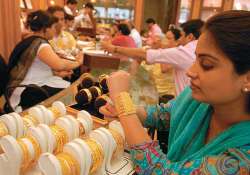Jewellers Back To Business After 21-Day Strike
New Delhi, Apr 07: Bullion traders and jewellers today returned to business, suspending three-week long strike following the government's assurance that it will consider their demand for rollback of excise duty on non-branded jewellery and

New Delhi, Apr 07: Bullion traders and jewellers today returned to business, suspending three-week long strike following the government's assurance that it will consider their demand for rollback of excise duty on non-branded jewellery and hike in import duty on gold.
Various bullion trade associations called off the 21-day strike after meeting UPA Chairperson Sonia Gandhi and Finance Minister Pranab Mukherjee yesterday who assured them that their demand for rollback of excise duty on non-branded jewellery would be considered.
“Most of the jewellery shops in the country have opened this morning as some of the 154 jewellery associations in the country decided to resume business,” All India Sarafa Association president Sheel Chand Jain told PTI.
He said agitating jewellers and bullion traders would have first transaction of the financial year 2012-13 today.
Traders are estimated to have lost Rs 20,000 crore due to the strike, while the government lost nearly Rs 1,200 crore in revenues on account of import duty.
Jewellers, however, have threatened that strike would resume if the proposal to levy excise duty of one per cent is not withdrawn in the Finance Bill, which is expected to come up before Parliament early next month.
“The strike has been suspended till May 11, as the Finance Minister has assured us on a decision on rollback on excise duty and customs duty by first week of May,” Jain said.
The strike from March 17 followed the Budget proposals a day earlier to double gold import duty to 4 per cent and levy of 1 per cent excise duty on non-branded jewellery.
A leading Delhi-based jeweller having shops in different parts of north India, P P Jewellers director Pawan Gupta said “We have opened all our showrooms and appreciate government understanding our concerns on tax hikes.”
Shops in Delhi opened with gold quoting moderately up at Rs 28,410 per 10 gm, from its last close on March 16, but trading volumes were thin.
“Trading volumes are thin but likely to pick up during the day as all the associate jewellers have been asked to return to their business after the government assurance,” Delhi Jewellers and Goldsmith Association president Ram Avtar Verma said.
A circular has been sent to all the affiliated members, informing them of the suspension of the strike till May 11, he added.
Meanwhile, the first gold rate came from Chennai, showing a fall of Rs 425 at Rs 28,115 per 10 gm in opening trade.
A day before jewellers began strike, gold prices in the national capital were Rs 28,140 per 10 gm. In Mumbai was Rs 27,760.
India, the world's largest gold consumer, imported 967 tonnes of precious metal in 2011. Gold is the second biggest commodity imported after crude oil, adding to the country's current account deficit.
Various bullion trade associations called off the 21-day strike after meeting UPA Chairperson Sonia Gandhi and Finance Minister Pranab Mukherjee yesterday who assured them that their demand for rollback of excise duty on non-branded jewellery would be considered.
“Most of the jewellery shops in the country have opened this morning as some of the 154 jewellery associations in the country decided to resume business,” All India Sarafa Association president Sheel Chand Jain told PTI.
He said agitating jewellers and bullion traders would have first transaction of the financial year 2012-13 today.
Traders are estimated to have lost Rs 20,000 crore due to the strike, while the government lost nearly Rs 1,200 crore in revenues on account of import duty.
Jewellers, however, have threatened that strike would resume if the proposal to levy excise duty of one per cent is not withdrawn in the Finance Bill, which is expected to come up before Parliament early next month.
“The strike has been suspended till May 11, as the Finance Minister has assured us on a decision on rollback on excise duty and customs duty by first week of May,” Jain said.
The strike from March 17 followed the Budget proposals a day earlier to double gold import duty to 4 per cent and levy of 1 per cent excise duty on non-branded jewellery.
A leading Delhi-based jeweller having shops in different parts of north India, P P Jewellers director Pawan Gupta said “We have opened all our showrooms and appreciate government understanding our concerns on tax hikes.”
Shops in Delhi opened with gold quoting moderately up at Rs 28,410 per 10 gm, from its last close on March 16, but trading volumes were thin.
“Trading volumes are thin but likely to pick up during the day as all the associate jewellers have been asked to return to their business after the government assurance,” Delhi Jewellers and Goldsmith Association president Ram Avtar Verma said.
A circular has been sent to all the affiliated members, informing them of the suspension of the strike till May 11, he added.
Meanwhile, the first gold rate came from Chennai, showing a fall of Rs 425 at Rs 28,115 per 10 gm in opening trade.
A day before jewellers began strike, gold prices in the national capital were Rs 28,140 per 10 gm. In Mumbai was Rs 27,760.
India, the world's largest gold consumer, imported 967 tonnes of precious metal in 2011. Gold is the second biggest commodity imported after crude oil, adding to the country's current account deficit.